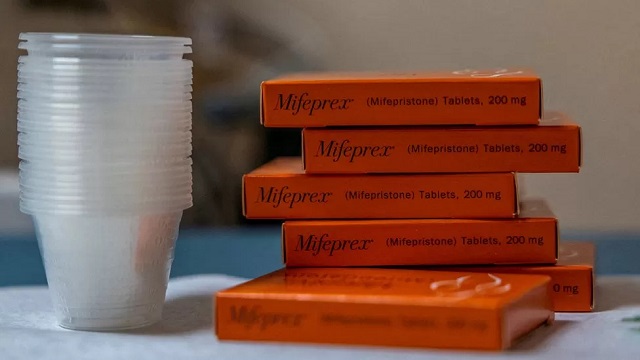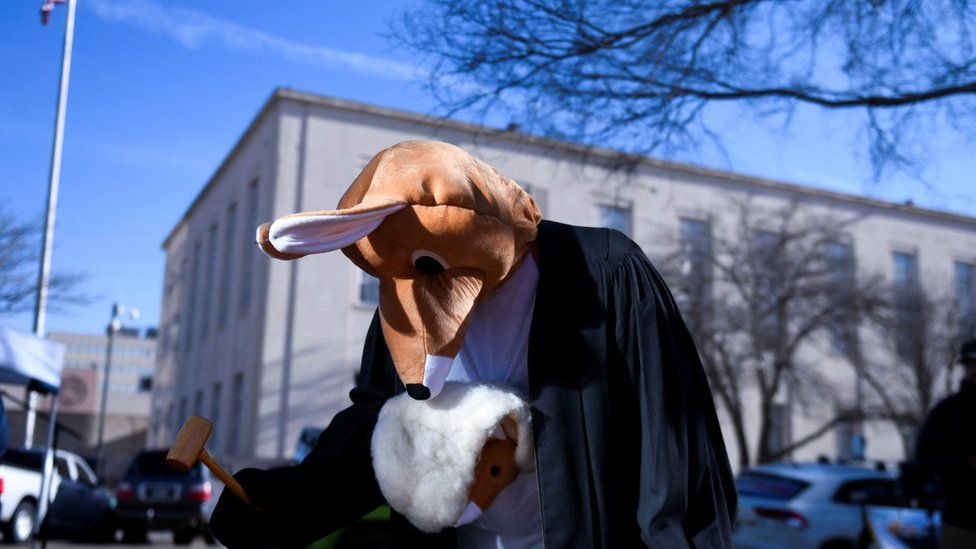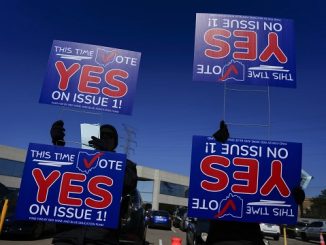
The Texas judge whose recent ruling could have banned an abortion drug across the US was hand-picked by activists who want to prohibit the procedure, experts say. So what is so-called judge shopping?
When Judge Matthew Kacsmaryk was growing up, his mother volunteered in crisis pregnancy centres and for anti-abortion organisations. When his sister became pregnant at 17, she gave the baby up for adoption, knowing “abortion wasn’t even an option”.
As an adult, both siblings would join their mother in the family fight to end abortion, with Judge Kacsmaryk joining the board of the very same Christian home for women with unplanned pregnancies where his sister once stayed. Before he was appointed to the federal judiciary by then-President Donald Trump in 2019, he worked for a Christian legal organisation, where he argued against pharmacies carrying contraceptives.
“He’s very passionate about the fact that you can’t preach pro-life and do nothing,” his sister Jennifer Griffith told the Washington Post in February. “We both hold the stance of you have to do something. You can’t not.”

Given his background, some were not surprised when Judge Kacsmaryk ruled last week to overturn the Food and Drug Administration’s (FDA) approval of the abortion drug mifepristone. Georgia State law professor Allison Whelan said that in his ruling, he used language that was clearly biased in favour of the anti-abortion movement, such as referring to a foetus as an “unborn child” and calling doctors who perform abortions “abortionists”.
During his Senate confirmation hearing, Judge Kacsmaryk said, in accordance with federal law, he would “disqualify himself in any proceeding in which his partiality might be questioned”. The Justice Department did not ask him to recuse himself, in this case.
But it’s no accident the landmark lawsuit was brought before him, experts say.
Rather, it is the latest example so-called “judge shopping”, a term some use to describe litigants who try to game the system hoping for a favourable outcome in their case.
While the principle behind it is nothing new – litigants have always tried to maximise their chances – the practice has gone to new partisan extremes, says Steve Vladeck, a legal scholar at the University of Texas.
Mr Vladeck says that Texas has become especially appealing to litigants on the right because of a quirk of how cases are allotted. In most states, cases are given to judges on a rotating basis, making it hard to guess which judge will preside over which case. But in Texas, there are several rural districts where only one or two judges handle the majority of cases.
In Amarillo, Texas, Judge Kacsmaryk sees 95% of civil cases, which means any lawsuit filed in that court is almost certain to end up in front of him.
The Alliance Defending Freedom, the law firm behind the Texas abortion drug case, did not respond to comment.
Although Texas remains one of the most extreme examples and tends to favour conservative cases, examples of judge shopping can be found on both sides of the aisle.
Several lawsuits aimed at dismantling Obama-era policies have been brought to the courtroom of Judge Reed O’Connor, who was nominated by Republican President George W Bush and serves, like Judge Kacsmaryk, in the United States District Court for the Northern District of Texas.
Meanwhile, Democratic states have attacked a number of Trump administration policies in courtrooms in Washington State, California, and New York, where they are more likely to get favourable rulings.
The political leaning of courts of appeal can vary, too, from region to region, so a plaintiff can hope to get a second chance at a ruling they want.
On Friday, following an emergency appeal from the Biden administration, the US Supreme Court temporarily halted a ruling that set limits on access to mifepristone, pausing restrictions so that justices can have more time to review the ongoing case.
The restrictions had been imposed by a lower appeals court, which kept the drug available after the Texas decision, but with conditions.

It has also asked for clarity on how the Texas case is affected by a conflicting ruling in Washington State.
In direct opposition to Judge Kacsmaryk’s ruling, Judge Thomas Rice in Washington ordered the FDA to keep the pill on the market in the 17 states – along with the District of Columbia – that had petitioned his courtroom.
That lawsuit, which argued the FDA should lift restrictions on the drug, was filed months after the abortion pill lawsuit was brought to Judge Kacsmaryk.
Mr Vladeck said it’s clear that lawsuit was strategically timed to challenge the Texas case, and that the Supreme Court will have to weigh in to decide which ruling is correct by law.
But, he says, it would be wrong to call the case in Washington “judge shopping” in the same way as the Texas case because it could have gone to several federal judges.
Although most were all appointed by Democrats, and litigants may have assumed they had a good chance at a ruling in their favour, that is several degrees of difference from cherry-picking your judge, Mr Vladeck said.
Nicholas Bagley, a law professor at the University of Michigan, said recent examples of judge shopping are different from just general manoeuvers to try and score advantage.
Over the years, litigants – either private groups such as the Texas abortion case, or states suing the federal government – have increasingly used the courts to make sweeping national policy changes.
“Stakes are higher when you have litigants who are bringing politically charged lawsuits, in an effort to give the US sitting administration a black eye,” he told the BBC.
He also cautioned that even the appearance of judicial bias can undermine the faith in the judicial system.
“I think there’s an intuition that we all share, that whether you win or lose your case shouldn’t depend on the judge that you happen to draw,” he said.
Source: bbc.co.uk






Be the first to comment